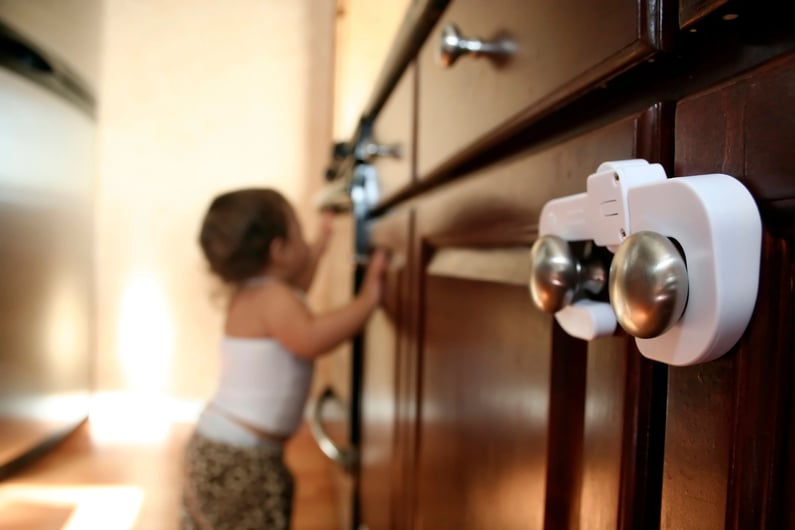.webp?width=795&height=530&name=blog%20images%20-%202022-03-14T181218%20(1).webp)
In 1961, Congress established National Poison Prevention Week to raise awareness, reduce unintentional poisonings, and promote poison prevention.
During this critical week, activities are often planned in your local area to bring awareness. We suggest reaching out to your local poison center by calling 1-800-222-1222. There could be an opportunity for you to partner with them to bring awareness to a broader audience.
According to the CDC,
- Poisoning is the third leading cause of unintentional injury death among children ages 1 to 19 years.
- 1,319,044 calls were made to poison control centers in 2015 after a child got into a potential poison. That’s over 3,600 calls a day, 150 every hour.
So what should you be doing to prevent poising and keep your children safe?
Poison Prevention Tips
Medicines
- Keep all medicines, and potentially poisonous substances, in locked cabinets or out of the reach of children and animals.
- Keep medicines in their original containers, properly labeled, and store them appropriately.
- Never share prescription medicines. If you are taking more than one medication at a time, check with your health care provider, pharmacist, or call the toll-free Poison Helpline (1-800-222-1222), which connects you to your local poison center, to learn more about any possible drug interactions.
Household products
- Household cleaners and disinfectants can make you sick if not used properly.
- Always follow the instructions on the label to ensure safe and effective use.
- Bleach is especially toxic and should never be mixed with anything other than water.
- Keep all household cleaners and potentially poisonous substances in locked cabinets or out of the reach of children.
- Never use food containers (such as cups or bottles) to store household cleaners or any other chemicals or products.
- Keep all laundry products locked up, high, and out of the reach of children.
- Do not use bleach on food products.
- Avoid using household cleaners and disinfectants on hands or skin improperly. Protective gloves are encouraged.
Chemicals
- Keep all chemicals and potentially poisonous substances in locked cabinets or out of the reach of children.
- Keep antifreeze and all chemicals and household products in their original containers.
- Never mix household or chemical products. Mixing chemicals can create a dangerous gas.
Back to school and art supplies
- Some art products are mixtures of chemicals and can be dangerous if not used correctly. Make sure children understand and use art products safely by reading and following directions.
- Do not eat or drink while using art products to prevent ingesting any harmful ingredients.
- Always wash skin with soap after coming in contact with art products.
- Wipe tables, desks, and counters after using art supplies.
- Keep art products in their original containers.
Food
- Wash fruits and vegetables with running water.
- Do not wash meat, poultry, or eggs.
- Never use commercial cleaning products on your food or food packaging.
- Wash your hands and work surfaces before, during, and after preparing food to prevent the spread of salmonella.
- Store food at the proper temperatures. Refrigerated foods should not be left out at temperatures above approximately 40 degrees F (5 degrees C).
- Always use clean utensils for cooking and serving.
Animals and insects
- Know what poisonous snakes live in your area and wear the proper attire (boots, etc.) when hiking outdoors for safety.
- Read the label on your insect repellent. Be aware that most repellent contains DEET, which can be poisonous in large quantities.
Plants, mushrooms, and berries
- Educate everyone in your family to identify poisonous mushrooms and plants.
- You can also call your local poison center to learn about common poisonous plants specific in your area.

Locks and Latches:
Parents might think that putting latches on cabinet doors will keep kids away, and there’s no need to worry. The truth is that kids are always interested in new challenges and figuring out puzzles. They love to discover new things. Children may quickly learn how to open things just by watching you. Be Poison Smart! Keep potential poisons in cabinets high up and never leave your children unattended in areas you know store chemicals that could harm them.
What to Do If You Think Someone is Poisoned
Do NOT make the poisoned person throw up! Call the Poison Center.
Direct Phone Line: 1-800-222-1222
T.T.Y: 866-688-0088
If the person has collapsed or stopped breathing, call 911 right away.
Remember that Impact Members have access to Telehealth doctors 24/7, and there is never a charge. These physicians can answer any questions you may have and call in prescriptions to your pharmacy of choice any day, any time. To get started, visit our website.


